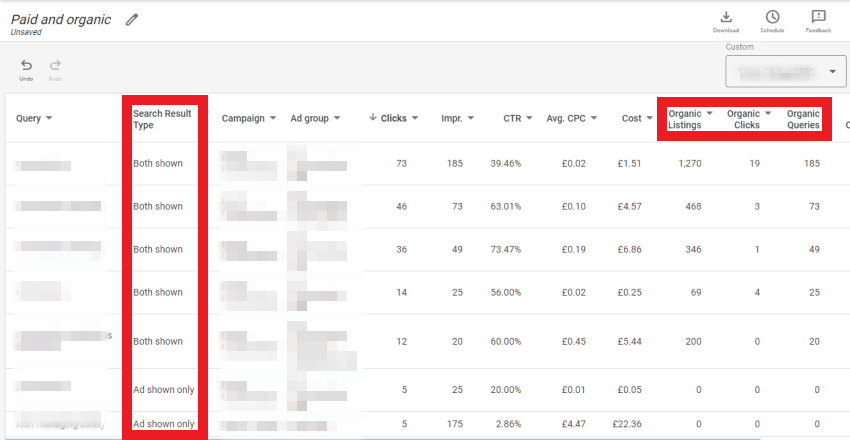Leveraging Paid Data for SEO Insights
Ben Fuller
Posted 26 August, 2022 by Ben Fuller in PPC
Leveraging Paid Data for SEO Insights
PlayStation or Xbox? Apple or Android? These debates have divided the friendship groups of millions around the world, but within the digital marketing world, it’s SEO and PPC that is sometimes a cause of contention.
However, in a world seemingly full of divide, I’ve looked at how we can help each other instead of causing more unrest. PPC data can be used to progress overall SEO efforts, resulting in an efficient and holistic approach to digital marketing.
PPC Fundamentals
For anyone new to PPC, pay-per-click is a model of digital marketing where, at least traditionally, advertisers pay a fee each time one of their ads is clicked, whilst utilising a myriad of messages, networks and targeting settings.
PPC could therefore be described (particularly by the SEOs among us) as “a way of buying visits to your site rather than attempting to earn those visits organically”, but there is lots of valuable data that can be unlocked when you pay Google money, most of which is immediate and highly transferable. So, without further ado.
Keyword Discovery
With Google now hiding the majority of organic keyword data within Google Analytics, bucketing it under ‘(not provided)’, SEO’s have been left to explore workarounds to ‘unlock’ this data. Whilst you’re still able to access some of it with Google Search Console, you’ll never be able to reveal everything.
*Inserts credit card details*
Paid keywords, however, have a great level of data on offer. Metrics such as sessions, time on page and goal completions are available in Analytics, and clicks, cost and conversions are ready to review in Google Ads.

Delving deeper into Google Ads, Search Term Reports can provide this data down to the exact term, and are therefore useful for several reasons:
- It allows you to easily find top performing keywords that you can align your pages toward (look for both high volume and high converting terms).
- It can help identify gaps in your content, especially around question-based terms (can, why, how, where, what).
- You can find expensive but high-performing keywords that may make sense to target through SEO/content marketing, helping to free up ad budget.
- You can also flag low performing keywords that should potentially be avoided (unless these provide lower commercial intent, that can be used at the top of the funnel or for informational content).
Finally, the Google Ads Keyword Planner allows you to bulk check the average monthly search volume for keywords across different countries and languages. It also details seasonal trends, which can be useful when diagnosing traffic drops.
Ad Copy

As we’re all aware, organic listings use the landing page metadata (aside from when Google feels like meddling that is) to create results on the SERPs, increasing its importance as the main reference point for users.
When creating ads, advertisers have the ability to take full control of what copy is included, as well as where that ad will send the user. This level of control means that advertisers know exactly what the user is seeing, how often they’re clicking it and how often a user goes on to convert, so overtime, you can identify the best performing messages.
Responsive Search Ads (the new default ad as of June 30th, 2022) can particularly hone this performance, where a maximum of 15 headlines and 4 descriptions, or 43,680 possible combinations, are tested repeatedly at every auction to identify what ad copy works best, and for what search term.
This can give those in the world of SEO great insight into what resonates with searchers for particular terms, and can therefore be used to inform metadata recommendations. This can include changes to page titles, meta descriptions and on site CTAs or copy.
The main caveat here is, just because copy works well for Google Ads it doesn’t mean it will work well for organic, but if your PPC team is sitting on this sort of information, it’s worth asking them (always after their morning cuppa).
Quality Score
Paid keywords are given a quality score out of 10 based on how they compared with competitors over the last 90 days. This is based on 3 components; expected CTR, ad relevance and landing page experience, where each is graded as below average, average or above average.

Quality score can therefore help identify weak links with regards to the headlines and descriptions on site, as well as your landing pages in general.
As an example, say a particular keyword has an above average score for ad relevancy and expected click through rate, but a below average score for landing page experience, this can used to help isolate an issue on the site, as well as highlighting which stage of the user journey your competitors are outperforming you.
Equally, if the expected CTR metric is above average, this highlights the language your users are receptive to, which can be replicated on your landing pages.
Paid & Organic Reports
Within the reporting realms of the Google Ads account, Paid & Organic Reports help advertisers review paid data alongside organic data.
This allows marketers to see collective data for their various listings, such as clicks, CTR and average position, across a number of search queries, whether that’s just organic, just paid or both. See below for what you can expect to find.

For PPC purposes, we are able discover additional keywords to target, particularly in instances where only organic results appear.
The same therefore applies to SEO, where you can see when ads are appearing (and if they’re performing well), but organic results are not.
Additionally, you can also spot where you rank highly for both organic and paid (or in some circumstances where organic is higher), which can help cut business costs should you decide to drop these ads.
Note– In order to review this report, your Google Ads account must be linked with Search Console.
More Quick-Fire Insights
- Placements
- Placement reports show a list of websites where ads have been shown across the Display and YouTube networks, providing associated click, cost and conversion data.
- High performing ad placements can therefore help identify potential outreach and link building opportunities, where you have real world data to support these prospects.
- DSA’s
- Dynamic Search Ads use your website content to target your ads, generating headlines and landing pages based on on page information (sound familiar?).
- If Google picks a page for a particular query, then chances are it’s the best page on your site for it.
- Devices
- PPC device reports allow users to view data across mobile, desktop, tablet and TV at the campaign, ad group and keyword level.
- This allows you to isolate device performance down to the exact search term, where poor performance can be indicative of inferior UX.
- Audiences
- Paid networks provide performance data on a combination of pre-defined audiences, such as demographics, life events, job titles, interests and more.
- This data can help direct changes on site with the aim of tailoring your landing pages, targeting and outreach to the right people.
- Auction Insights
- Auction insights reports let you compare metrics such as impression share, overlap rate and outranking share with other advertisers who are participating in the same auctions that you are.
- This can not only help identify new competitors, but with data segmented by device, it can help trigger UX improvements should metrics decline on a particular device.
Summary
There are plenty of other examples where paid data, and indeed other channels within online marketing, can be used to offer insight to the world of SEO, but hopefully this helps widen your horizons when looking for areas of optimisation.
If you have any other paid media examples that will help benefit the topic of this report, then please comment below.
Now go bug your PPC department, they’ll love to show off.







Great post Ben but do search console provides all the actual data? I READ Ahrefs blog a month ago where there was huge data missing.
Merci c’est bon à savoir !
Thank you so uch for those usefull explaination :D